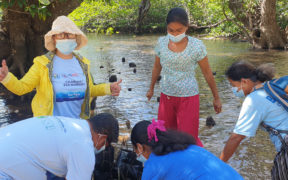Tag:
equity

In-Depth
Twin-Bakhaw: Connecting SRH to a Community’s Ecosystem — Part 2
September 21, 2021
The Twin-Bakhaw project advocates for gender equity via sexual and reproductive health services among indigenous populations. Each newborn will have a “twin” mangrove seedling, which the newborn’s family must plant and nurture until it is fully grown. The project exemplifies the importance of family planning and reproductive health interventions in long-term environmental protection measures. This is part 2 of 2.
chat_bubble0 Comment
visibility15871 Views













